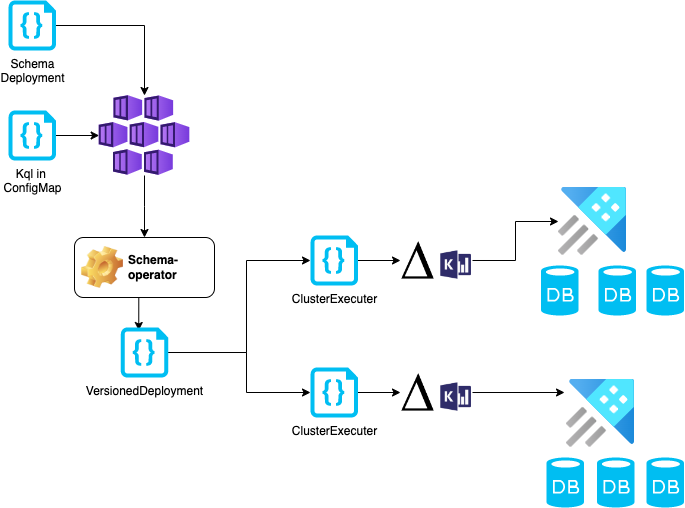Azure-Schema-Operator #
Note: The API is expected to change (while adhering to semantic versioning). Alpha and Beta resources are generally not recommended for production environments. Alpha, Beta, and Stable mean roughly the same for this project as they do for all Kubernetes features.
Azure Schema Operator project is aimed to manage schema changes of various Azure Resources (e.g. Azure SQL, Azure Data Explorer, Azure EventsHub) using declarative approach via Kubernetes resources.
A developer defines the schema in source location (e.g. configMap) and the operator will make sure to apply it on all the defined clusters.

The Operator offloads the heavy lifting to schema tools such as delta-kusto
and instead focuses on ensuring the validity of the deployment process.
The operator will validate that the schema was deployed on all databases on all clusters or rollback to a previous successful version.
Currently supports:
- Azure Data Explorer (Kusto)
- SQL Server
- Eventhubs (Schema-Registry)
Soon To Be supported:
- Cosmos
Status #
The project is currently in Alpha status, you can follow status and project plans in the open tasks page
Usage #
Follow the installation guide to deploy the operator.
The schema operator expects a configMap with the kql data (generated by delta-kusto on the dev environment)
apiVersion: v1
kind: ConfigMap
metadata:
name: dev-template-kql
namespace: default
data:
kql: |
.create-or-alter function Add(a:real,b:real) {a+b}
In this simple example we have a configMap that defines a single function.
Now we create the SchemaDeployment object (our schema object to apply on all clusters)
apiVersion: dbschema.microsoft.com/v1alpha1
kind: SchemaDeployment
metadata:
name: master-test-template
spec:
type: kusto
applyTo:
clusterUris: ['https://sampleadx.westeurope.kusto.windows.net']
db: 'tenant_'
failIfDataLoss: false
failurePolicy: rollback
source:
name: dev-template-kql
namespace: default
The template defines the cluster list (sampleadx) and a regular expression to filter databases by their name (tenant_ is our sample filter but can be any regexp).
Authentication #
The schema-operator needs access and perimssions on the target databases.
Authorization can be defined either by MSI (recommended) or by defining a secret.
To use MSI, the AZURE_USE_MSI environment variable needs to be defined on the manager pod.
To use a secret, we need to define a secret with the relevant credentials:
apiVersion: v1
kind: Secret
metadata:
name: schemaoperator
namespace: schema-operator-system
type: Opaque
data:
AZURE_SUBSCRIPTION_ID: <base64 encoding of the subscription>
AZURE_TENANT_ID: <base64 encoding of the tenant id>
AZURE_CLIENT_ID: <base64 encoding of the client id>
AZURE_CLIENT_SECRET: <base64 encoding of the client secret>
and later define these as env entries:
env:
- name: AZURE_USE_MSI
value: 'false'
- name: SCHEMAOP_CLIENT_ID
valueFrom:
secretKeyRef:
key: AZURE_CLIENT_ID
name: schemaoperator
optional: true
- name: SCHEMAOP_CLIENT_SECRET
valueFrom:
secretKeyRef:
key: AZURE_CLIENT_SECRET
name: schemaoperator
optional: true
- name: SCHEMAOP_TENANT_ID
valueFrom:
secretKeyRef:
key: AZURE_TENANT_ID
name: schemaoperator
optional: true
Prerequisites #
The schema operator is written in GO. To develop the project you need the following:
- Go
- operator-sdk
- Docker
- sqlpackge
- delta-kusto
Running the tests #
The project uses Ginkgo with envtest
To run the tests locally simple run:
make test
| :exclamation: Mac M1 users (arm64) should run under rosetta or in the dev container, envtest does not support darwin/arm64. |
|---|
Built With #
The project is build using the Operator SDK
Contributing #
Please read our CONTRIBUTING.md which outlines all of our policies, procedures, and requirements for contributing to this project. As well as the contribution docs on development and testing.
Versioning and changelog #
We use SemVer for versioning. For the versions available, see the releases on this repository.
Authors #
- Jony Vesterman Cohen
- Dmitry Meytin
License #
This project is licensed under the MIT License - see the LICENSE file for details
Acknowledgments #
- Delta-Kusto for the cooperation when we developed this operator.
- Azure-service-operator for a source on how to write a good operator.
- operator-sdk for fast development process.